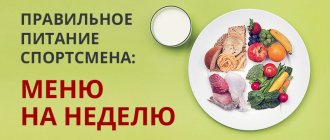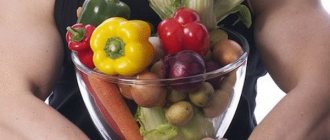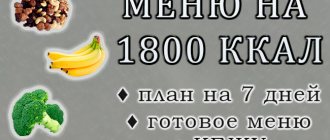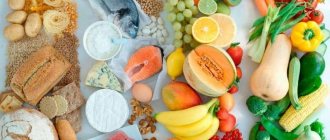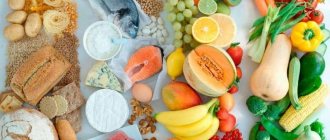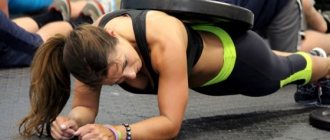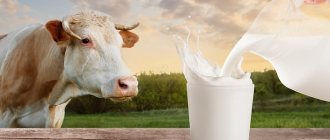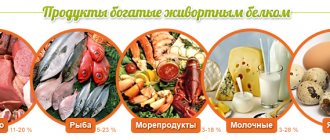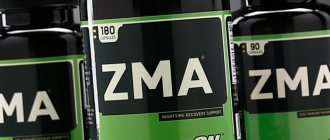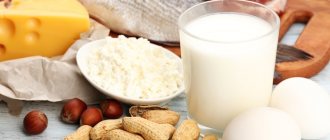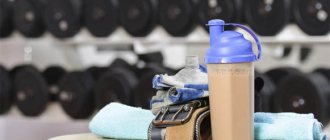Vegetarians today still encounter some surprise and misunderstanding on the part of their opponents on the “meat” issue. What can we say then about vegetarian athletes - they can probably make up the top questions from meat-eaters who have already set their teeth on edge: where to get protein from? Do you have enough energy? Can muscle mass grow? How to combine, for example, bodybuilding and giving up animal protein?
It turns out that vegetarianism is not such a rare phenomenon among athletes, including those whose names are known throughout the world. Bodybuilders Bill Pearl, Roy Halligen, powerlifter Patrick Baboumyan, tennis player Martina Navratilova, basketball players Robert Parish and John Salley, legendary football player Joe Namath, boxer Mike Tyson are living proof that giving up meat is not an obstacle to achieving athletic heights. They have outstanding awards and global recognition behind them. And all of them, some earlier, some later, came to various forms of vegetarianism.
Are vegetarianism and bodybuilding compatible?
Before answering the question posed, it is necessary to understand what vegetarianism is and the reasons for its occurrence.
Vegetarian bodybuilder
The reason for consciously refusing to eat meat may be:
- Health problems, this may be the body’s failure to digest animal products, or allergic reactions. A person may simply not like the taste of meat
- The desire to lead a healthy lifestyle, because it is plant foods that help cleanse the body of waste and toxins, protect against cardiovascular diseases, and normalize the gastrointestinal tract
A big plus for vegetarians is that they do not suffer from excess weight gain and are more protected from various diseases, even some types of cancer. And in general, people who eat meat feel much better.
- Conscious reluctance to see animals killed for human needs, this also applies to clothing made from killed animals
- Religious principles, some of the world's religions categorically deny the consumption of food of animal origin
- To save money, some people give up meat
- And some refuse and cite the reason that the processing of meat and animal products is very polluting to the environment.
Sometimes these are several reasons combined, sometimes just one, but one way or another, people consciously refuse animal fats and proteins.
Types and reasons of vegetarianism
There are three types of vegetarians:
- Strict vegetarians completely exclude food of animal origin from their diet.
- Lacto-vegetarians, in this case the consumption of milk and fermented milk products is allowed
- Lacto-ovo vegetarians, in addition to dairy products, also eat eggs.
Scientists have proven that to build muscle, protein is not as necessary as carbohydrates. They play a big role in this process. And you need very little protein itself - 1.6 grams per kilogram of weight.
Vivid examples of the reality that vegetarianism and bodybuilding are compatible are:
- Corey Everson, she gave up meat as a 17-year-old girl. But this did not stop her from becoming a six-time bodybuilding champion.
Corey Everson
- Andreas Kahling, he looks great for his age and now
Andreas Kahling,
- Bill Pearl, the brightest bodybuilding star of the 60s, is a prime example of a vegetarian bodybuilder.
Bill Pearl
It is worth noting that muscle building would not be possible without special vitamins and supplements. These sports supplements are taken even by those athletes for whom meat is a common food and do not eat chemical complexes.
IMPORTANT: If a person has been involved in sports for quite a long time, and has not limited himself in food, and has decided to become a vegetarian, then this should be done gradually, and not immediately after the decision has been made.
The disadvantage of vegetarianism when building muscle mass is that you may not feel hungry for a long time. This is good for those who want to lose weight, but not for bodybuilders. They should eat frequently.
Vegetarian girl
Problems of vegetarian nutrition in relation to athletes
Since the diet of a vegetarian athlete excludes animal products, his body does not receive some nutrients. Among them:
- protein;
- vitamins B (B12) and D;
- magnesium;
- calcium;
- Omega-3 fatty acids;
- creatine
We recommend: “Sports nutrition Omega 3-6-9.”
And also: “How to take creatine correctly.”
Another problem with vegetarianism is the large amounts of fiber entering the body with vegetables. It is useful because it improves digestion, but at the same time absorbs some of the essential amino acids in the intestines. Fiber in combination with complex carbohydrates ensures a feeling of fullness for a long time. This is good for those losing weight, but not for bodybuilders who need to eat regularly.
How does vegetarianism affect muscle growth?
There is a specially designed diet for vegetarian athletes. Although many people doubt the effectiveness of this method of muscle building, it is quite possible. In addition, vegan athletes feel much healthier than their sports colleagues who eat meat. After all, it is animal food that contributes to an increase in bad cholesterol in the blood and the development of cardiovascular diseases.
From a properly selected menu, a vegetarian receives the necessary amount of protein for muscle growth. The missing components can be replenished with the help of special sports supplements. But we must remember that muscles will not grow, even if protein is supplied in excess of the norm, and there are no fats in the diet. This will also affect the athlete’s appearance: the skin will become flabby, hair will begin to fall out, and muscle mass will become weak. Therefore, you should definitely consume vegetable oils, coconut milk, and, if vegetarian principles allow, cow's milk.
Vegetarian athlete
It should be remembered that no expensive supplements can replace good nutrition. And, if there is a lack of carbohydrates in the diet, but with a large amount of protein, the body itself transforms it into carbohydrates. Thus, the athlete only harms his health.
Whole Fuel
Premium quality vegan blend.
Why did we develop Vegan Fuel?
You may often find yourself turning to junk food and snacks for convenience to satisfy your hunger while leading a busy lifestyle. The time required to purchase, plan and prepare healthy and nutritious meals is quite long. There's no need to panic though, Myprotein has raised the bar again with its brand new product - Vegan Fuel Blend. This powder supplement is rich in nutrients and contains proteins, fats, carbohydrates, minerals and vitamins in the ideal proportions that your body needs.
Made from natural ingredients without any animal products, milk, soy, eggs or sugar, our Vegan Fuel blend has outstanding nutritional value. Featuring an impressive ratio of all three macronutrients, each serving contains a carefully selected blend of pea protein isolate, brown rice protein, oat flour and a specially formulated blend of vitamins and minerals
. We have created a line of mouth-watering flavors: Vanilla, Chocolate and Vanilla Raspberry. Without a doubt, every sip of this cocktail will make you feel like it's your cheat day!
What are the key benefits of vegan blend?
A question we often hear as nutritionists is, “How will this product help me?” Let us explain it to you!
- Outstanding macronutrient composition - 29.8 grams of protein per serving will support you on your way to achieving your training goals, helping to grow and maintain muscle mass. Carbohydrates are the main source of energy for our body, so we included them in this product in the amount of 39.2 grams per serving. Moreover, the mixture contains 10.6 grams of dietary fiber, which fits perfectly into the requirements of a healthy, balanced diet. These data are given for raspberry flavor; for chocolate and vanilla flavors, the values may differ by up to 10%.
- Recommended Dosages for Vitamins and Minerals - Each 100g serving provides 20-40% of the Recommended Daily Intake (RI) of a full spectrum of vitamins and minerals.
- Waste-free product - shelf life for a whole year!
- An affordable, convenient and easy-to-prepare product.
- Suitable for vegans and vegetarians.
Where can a vegetarian get protein?
For those who want to switch to a vegetarian diet, the question arises where to get the necessary protein.
- With strict vegetarian principles, protein can be taken from mushrooms, nuts, legumes, vegetables, herbs, fruits, berries, grains, cereals
- If a bodybuilder is a lacto-vegetarian, then this makes it possible to consume milk and dairy products
- For less strict vegetarianism, you can add eggs to your diet.
But in order to get the required amount of protein, vegetarians need to adhere to a varied diet and combine different foods. Then some products, with a low content of amino acids necessary for the synthesis, will be supplemented by others. In this case, incomplete proteins become complete. An example for a combination would be legumes and grains. They produce complete protein, and are even better digestible than meat.
Products containing protein
Vegetarianism and amino acids
Amino acids are indispensable for the human body; the required amount can only come from food, since the human body cannot synthesize them itself. For an adult, this figure is 8 amino acids, and for children - 10 amino acids.
There is a myth that vegetarians cannot get all the necessary amino acids from plant foods, and cause great harm to their health. But, as practice shows, animals also cannot synthesize amino acids on their own, but receive them together with plant foods. This myth especially does not apply to vegetarians who consume milk and eggs in their food.
Essential amino acids are found in greens, vegetables and fruits
For beginner vegetarians, or for those who still doubt the veracity of the above, we present a list of amino acids and products that contain them:
- Tryptophan is found in bananas, dates, milk, yogurt, peanuts, sesame seeds, pine nuts and soybeans
- Lysine is found in nuts, wheat and dairy products
- Valine is found in mushrooms, peanuts, soy, dairy products and grains
- Methionine is present in legumes, eggs and dairy products
- Threonine is present in legumes, nuts, eggs and dairy products
- Isoleucine is present in seeds, peas, eggs, almonds and cashews.
- Leucine is found in lentils, seeds, nuts, and brown rice.
- Phanylalanine is present in sweetener, as well as in soy, milk and eggs
IMPORTANT: Children need two more amino acids: histidine and arginine. You can replenish your reserves with the following products: yogurt, seeds, peanuts, lentils, sesame.
As the list shows, all the amino acids the body needs can be obtained from plant foods. An exception may be the case when a person decided to become a vegetarian, but did not take care of variety in food. To prevent this from happening, you must:
- Eat legumes of all types
- Combine protein and amino acid sources
Vegetarian girl
As for non-strict vegetarians, regular consumption of dairy products and eggs will protect against amino acid deficiency.
What is the best protein for vegetarians?
Athletes need to consume enough protein, because this substance is the main building material for muscles.
Sports nutritionists have not come to a consensus regarding the daily intake rate, so per day, depending on the intensity of training, it is recommended from 1 to 2 g of protein per 1 kg of weight, and in the case of vegetarianism, the intake rate increases by 10%. With the help of diet alone, it is problematic to choose the right diet that would provide the required amount of protein amino acids at the right time, so the main sports nutrition for vegetarians is high-protein mixtures (proteins), which can be made from different sources:
Whey Protein and Casein
Whey protein is made from whey and has the fastest absorption rate. That is why it is taken immediately after training, in order to provide the muscles with essential amino acids.
Casein is obtained by enzymatic curdling of milk and, unlike all other types of protein in this article, has the slowest amino acid release rate (about 6 hours), so it is best suited for feeding muscle tissue over long periods of time - at night or between main meals food.
Egg protein
Egg protein (egg albumin) contains all the necessary amino acids and is quickly absorbed in the digestive tract, so it can be used as a replacement for whey protein. The only disadvantage of this protein is the higher price and small selection of products, because not all sports nutrition brands produce egg protein.
Eggs are one of the main products in bodybuilding - they are useful for absolutely everyone who needs high-quality protein, including for muscle gain, but not only. Egg protein is indicated for people intolerant to soy and dairy products.
Soy and other plant proteins
Soy protein has a complete amino acid profile compared to other plant proteins. The myth that phytoestrogens in soy can reduce testosterone secretion has long been refuted by many scientific studies, so soy protein is suitable for both women and men.
Soy protein contains a large amount of vitamins and microelements, so it can serve as a worthy alternative to whey or egg protein.
Features of protein intake for vegetarians
- The most optimal frequency of intake is 1-2 servings per day: 1 serving of whey/egg/soy protein immediately after training + 1 serving of casein before bed. If you do not consume dairy products, then take 1 serving of another protein in the middle of the day instead of casein;
- whey, egg, soy proteins and casein, with their high protein content, have low calorie content, so they can be used not only during weight gain, but also for weight loss;
- with a vegetarian diet, it is preferable to mix a serving of protein with low-fat milk, but you can also mix it with soy, almond milk or water;
- Whey protein is rich in the essential amino acids BCAA (leucine, isoleucine and valine, which make up about a third of all muscle protein), so if you completely abandon animal products and choose plant protein, an additional intake of BCAA (5 grams per day) is recommended;
- In order to provide a high-protein diet, those who love sweets can add protein when preparing various desserts and use ready-made protein mixtures for baking. But ready-made formulas most often use milk protein, which is not suitable for all vegetarians.
Vegetarianism and essential vitamins
Vitamins are essential for the normal functioning of the body. They prevent or with their help treat various diseases and increase the body’s resistance to viral infections. Sources of vitamins are both plant foods and animals.
Since vegetarianism involves abandoning animal foods, let’s consider what basic vitamins can be obtained exclusively from plant foods:
- B1 - the lack of this vitamin affects the functioning of the nervous system, cardiovascular and digestive tract. The highest amounts of thiamine are found in carrots, potatoes, oats, wheat germ and cabbage.
- B2 - with its help, cell restoration processes occur, as well as their growth. Helps the visual organs to function fully. Mainly found in meat and milk, but with the help of peas, green onions, grains, tomatoes you can thoroughly replenish your supply
- B6 - with a deficiency of this vitamin, changes occur in the nervous system, metabolism is disrupted, and swelling and rashes on the skin may occur. You can replenish your body with this vitamin with the help of legumes, grains, and vegetables.
- Folic acid is especially necessary for the full development of the fetus. Mainly found in the leaves of the plant, but only green in color
- A lack of biotin affects the general condition of the body and causes a feeling of fatigue, appetite may disappear, and muscles begin to ache very much. In order to prevent this condition, it is necessary to include peas, oatmeal and soy in the diet.
- Nicotinic acid plays a huge role in the life of the body; its deficiency affects the condition of the skin and the functionality of the nervous system. You can get enough vitamin from mushrooms, fruits, vegetables, legumes and grains
- C - this vitamin helps you recover faster and protects against viral infections, affects metabolism, and affects blood vessels. Long-term non-healing wounds indicate its deficiency. A large amount of this vitamin is found in currants, rose hips, red bell pepper, parsley, dill
- Pantothenic acid is used to treat burns and bruises, as well as diseases of the nervous system. You can find it in peas, wheat, asparagus, barley
- Rutin is indispensable for the normal state of the body's vascular system. Contained in cherries, black currants, cherries, gooseberries and cranberries
- A lack of vitamin E negatively affects the functioning of the entire body. To replenish reserves, you need to include vegetable oils, green vegetables, and wheat germ in your diet
- Vitamin K is responsible for blood clotting. For complete intake into the body, it is necessary that cabbage and lettuce be present in the diet.
A person gets all the necessary vitamins from plant foods.
IMPORTANT: Vitamins A and D require eggs, butter, milk - this will not be a problem for vegetarians who include these products in their daily diet.
As you can see, from the listed basic vitamins, and the products from which these vitamins can be taken for their body, vegetarians do not lack them.
Vitamin B12 in a vegetarian diet
Vitamin B12 plays an important role in the functioning of the body. Its deficiency can cause severe headaches, indigestion and diseases of the intestines and nervous system, and can provoke disturbances in the ability to remember information.
It is believed that this vitamin cannot be obtained exclusively from plant foods. And a lot of people criticize vegetarians for this. But it is not true that this vitamin is found only in meat. A sufficient amount of the vitamin can be obtained from eggs and dairy products. For lacto-vegetarians this is not a problem; they can easily do this by consuming these products regularly.
Vitamin B12 is essential for healthy well-being
In addition, there are now a sufficient number of ways to replenish your supply of vitamin B12. These are beer shakes, breakfast cereals with added vitamins and dietary supplements.
Important: Vegetarians should be careful when eating foods containing baker's yeast. They destroy vitamin B12.
What can vegetarians do?
Vegan protein without GMO
Vegan protein is a special protein that has a light taste and excellent solubility. It has a unique composition that is suitable for vegetarians and those with allergies to milk protein.
Plant-based protein powders can be a great post-workout supplement for quick recovery. They easily cover the need for protein; at the same time, they can be consumed not only on their own - in the form of drinks - but also added to some vegan dishes. However, make sure that your protein powder comes from a non-GMO food source. Such powders are preferable because the raw materials for them undergo more gentle processing and do not contain chemicals of questionable usefulness, including monosodium glutamate, and you can even find “organic” ones.
Powders based on whey protein are undesirable because... this ingredient can promote inflammatory processes, increase allergies, irritate digestion - but, fortunately, this is not the only possible option.
Soy protein isolate (soy protein) is also not our priority, although it is a vegan option: soy isolate is a highly processed soy product that can cause an allergic reaction in some. It is better to include more natural soy products in your diet, such as tofu, tempeh, and edamame. An ideal example is hemp protein, which is simple, derived from a single source - hemp seeds - and 100% vegan. It contains all the necessary amino acids and many useful substances (and hemp seeds do not contain narcotic substances, they are safe - Vegetarian). You just need to choose a non-GMO product and, better yet, a raw food product - you can always find those.
L-Glutamine (Easily Digestible Glutamine)
Glutamine is one of the most important amino acids, it helps build muscle and recover, and also has anti-inflammatory properties.
This supplement is now very popular among athletes because... Glutamine is one of the most important amino acids, it helps build muscle and recover, and also has anti-inflammatory properties. Use it before and after workouts. The best L-glutamine supplements are vegan, raw food, and minimally processed options. These supplements can be mixed into your workout drink, drunk as part of a smoothie, added to raw oatmeal (soaked overnight), or even cold drinks. El-glutamine cannot be heated - it loses its beneficial qualities.
BCAAs
"Amino acids with branched side chains" - English. Branched-chain amino acids, or “BCAA” for short, are a very useful dietary supplement for athletes. It allows you to gain muscle mass or maintain it, preventing muscle loss due to lack of protein. The BCAA supplement contains L-leucine, L-isoleucine and L-valine. “L” means an option that is easier to digest: the supplement does not require digestion in the stomach, the nutrients immediately enter the bloodstream. BCAAs are especially useful if you cannot eat high-calorie foods before exercise (after all, eating high-calorie foods is a sure way to get a “stone in the stomach” during training). It is easy to find a vegan version of this supplement, as well as BCAAs as part of another sports supplement (it turns out to be “2 in 1”).
poppy
Peruvian maca powder is a more natural alternative to other nutritional supplements for athletes.
Maca is a wonderful energy food that supplies your body with beneficial amino acids that promote post-workout recovery.
This wonderful energy product supplies your body with beneficial amino acids that promote post-workout recovery. Maca optimizes hormonal levels, helps muscle growth, speeds up metabolism, is good for the brain, prevents muscle spasms and inflammation in the muscles. This powder from Peru is truly a godsend and can be used to make many delicious vegan dishes. In addition to the above, vegan athletes should include the best multivitamin you can find and vitamin B12 in their diet. It's worth repeating: all of these supplements make sense only "in the background", on the reliable basis of your complete, healthy and light diet. These supplements are not the only ones possible; different athletes may have their own secrets and best practices. However, the listed substances are useful in that they allow you to avoid the negative, “dark” side of sports nutrition - they do not cause inflammatory processes, because are not made up of crazy “chemistry”.
Vegetarian menu for gaining muscle mass
Proper and balanced nutrition is the key to good health, and if you want to gain muscle mass, the key to success. To do this, you need to include in your menu not only protein, but fats and carbohydrates. The number of meals should be increased to six times a day. These are five basic techniques, and one before bed. If you do not follow this advice, the body will experience stress and store excess fat, in addition, muscles will begin to break down.
IMPORTANT: You should not eat too much or skip even one of the meals.
Bodybuilder's Breakfast
Sample menu for a vegetarian bodybuilder.
Breakfast:
- Freshly squeezed juice from vegetables or fruits
- At least three slices of whole grain bread
- Peanut butter
- Porridge can be prepared with cow's milk or milk substitutes
Snack:
- Vegetable casserole
- Nuts, preferably a mixture
Dinner:
- Vegetable soup
- Vegetable stew
- Soy meat
- Tempe
Snack:
- Low-fat kefir
- Seeds
- Fruit jam
- Slice of bread
Dinner:
- Boiled potatoes, mashed
- Cheese
- Boiled or steamed broccoli
- Half an avocado
- Tofu
The Vegetarian Dinner Table
Vegetarian bodybuilders need to include sports supplements in their diet, but they should not be the main supplier of protein. One half of the daily protein intake comes from supplements, and the other half should come from food.
Doctors' opinions on vegetarianism
Doctors often oppose vegetarianism. This is especially true for small children, mothers carrying a baby, elderly and sick people.
But still, most people settle on the idea that vegetarianism is good for health and well-being. This does not apply to the strictest of the types, but includes dairy products and eggs.
The benefits of vegetarianism are:
- Lowering sugar levels
- Strengthening the immune system
- Complete cleansing of impurities and toxins
- Improvement of vascular condition
- Reducing cholesterol
Doctors have different opinions about the dangers and benefits of vegetarianism.
Vegetarian diets can be prescribed to treat or prevent the occurrence of certain diseases.
- Before switching to a plant-based diet, you should consult a nutritionist.
- Pass the necessary tests, undergo a full examination
- Together with a specialist, you will decide on the necessary set of products
- Create a detailed menu
- Develop a smooth transition to a plant-based diet
A mandatory recommendation from all doctors is to include milk, eggs and honey in the diet.
Myths about vegetarianism
Vegetarians have many supporters and opponents. Both of them are looking for arguments in their favor, creating new myths.
Vegetarian's constant companions
Myths about the dangers of vegetarianism:
- The first myth says that people who do not eat meat are weak and powerless. In response to this myth, one can list a huge number of vegetarian athletes who have set world records and received the title of champions. But, it should be noted, this became possible only with proper and balanced nutrition.
- It is believed that in order to assimilate information it is necessary to eat meat, and vegetarians, refusing it, become stupider. This has been refuted by science, since all the vitamins necessary for this process are contained in legumes, and are very well absorbed by the body
- Vegetarians do not receive the proteins necessary for life; we refuted this myth at the beginning of the article. You just need to know how to mix food correctly, then there can be no question of shortages
- It is believed that vegetarians have a permanent deficiency of iron levels in the blood. But, this microelement is found in a large number of vegetables and fruits; only for its absorption it is necessary to include vitamin C in your diet. Following this rule, a vegetarian will not have problems with hemoglobin levels
- Vegetarians lose weight catastrophically. This may be refuted by the world's celebrities who adhere to abstinence from meat. This is Brad Pitt, Nicole Kidman, Tom Cruise, Alicia Silverstone, Pamela Anderson, Orlando Bloom. Looking at their bodies, there can be no talk of any dystrophy
Vegetarian family at the dinner table
- Mothers carrying babies, and the children themselves, need meat. Proof of the opposite point of view are Hindus, adherents of a strict religion, and among celebrities, as an example, we can name Uma Thurman, she has followed a vegetarian diet since childhood, and was able to bear and give birth to completely healthy children. You can add Alicia Silverstone to this list
- Another belief is that our grandfathers and great-grandfathers always ate exclusively meat. But, if you carefully delve into history, this is another myth, because strict fasts were held almost the entire year, and ancestors replenished their energy reserves exclusively with food of plant origin
Let's also consider the myths created by the adherents of vegetarianism themselves:
- Switching to a vegetarian diet will help solve excess weight problems. This is not so, it all depends on the individuality of each organism, and the correctness of a well-thought-out menu. If your diet contains a large amount of fat, you can only gain weight, not lose it.
- Vegetarians believe that their way of eating is much healthier than that of people who eat meat. The fact that sticking to a proper and healthy diet testifies to the benefits of this myth. But, at the same time, scientists have proven that eating meat can prevent a number of serious diseases.
- Vegetarians argue that a person is not able to digest meat, and that this process takes about two days, sucking all the energy from the body. Scientists have completely refuted this myth, since the acid in the stomach breaks down any food in a short period of time
- Vegetarians believe that among them there are more long-lived people than among meat eaters. Practice says the opposite
A girl thinks about the benefits and harms of vegetarianism.
As can be seen from the list, both have their own myths and beliefs. A person should consciously approach a vegetarian diet, not forgetting about his health and well-being.
Peculiarities
The athletic-vegan life is not as complicated as it might seem at first glance. Of course, many beginners often face the problem of meeting their nutritional needs when, when consuming foods, there is a lack of nutrients and beneficial substances. But, if you plan everything correctly, then in the future your body will only say “thank you,” and success in the sports field will not take long to arrive.
As evidence, we can cite several famous people who have successfully combined sports and veganism for many years:
- Ultramarathon runner Scott Jurek.
- Boxer Mike Tyson.
- Athletics champion Carl Lewis.
- Tennis player Sirena Williams.
A vegetarian diet can fit perfectly into an athlete's daily diet. Even if you exclude fish, meat, dairy and other foods rich in protein from the menu, the lack of a useful substance is easily compensated for by a similar one, but of a plant nature. We must not forget about the huge amount of good carbohydrates, which are impossible to do without during physical activity - after all, they are a source of energy for the whole day.
How to gain muscle mass as a vegetarian: tips and reviews
- First of all, novice bodybuilders who are vegetarians need to create the right menu for every day. It must contain fats, proteins and carbohydrates. Only with a balanced diet can you build muscle mass
- You need to eat in small portions, but often, every three hours
- You should not allow yourself to feel very hungry, this will negatively affect your muscles.
- Strength training is required, it is recommended to exercise for no longer than half an hour, otherwise there is a large waste of energy, which is very difficult for vegetarians to replenish, and muscles can begin to break down
- Take vitamin complexes and special sports supplements
- To gain muscle mass, proper sleep and rest are mandatory, because muscles are built up precisely at this time, and not during the training process.
